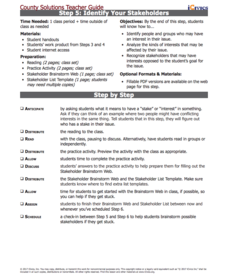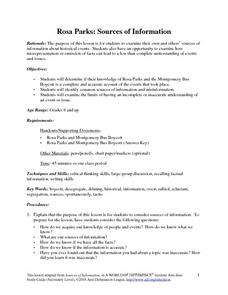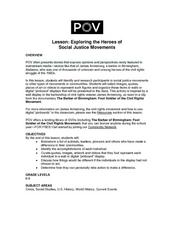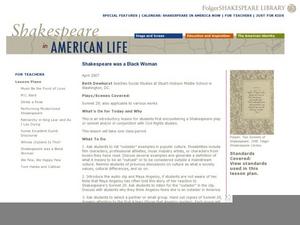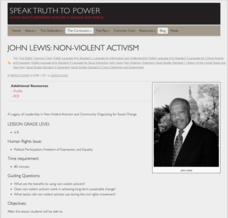Curated OER
After: A Study of Individual Rights
Use the dystopian novel After by Francine Prose to spark discussion about individual and student rights. Learners read the novel, evaluating how far a school can go to control its attendees. As they read, scholars fill out a chart...
BBC
Crime
Crime and punishment! Learners discuss the law, civics, and crime in the UK. They brainstorm lists of crimes and possible punishments, complete activities on a website, role-play a Juvenile Court scenario, and try to think of ways they...
John F. Kennedy Presidential Library & Museum
Analyzing the Inaugural Address
Get high school historians to step outside their own shoes by responding to JFK's inaugural address from the perspective of a civil rights activist, a soviet diplomat, or a Cuban exile. After a class discussion about the address, the...
Curated OER
Qualifying to Vote Under Jim Crow
Literacy tests, poll taxes, grandfather laws? Scholars study the systematic ways African-Americans were kept from voting even after it was made a law. They analyze a series of primary source documents, complete a worksheet, and engaged...
iCivics
Step Eight: Positions, Please!
Everyone sees the results of public policy, but not everyone understands the strategy that goes into creating an effective one. Now that your class understands the brainstorming process from earlier in the series, they continue on to the...
iCivics
Step Nine: Action Campaign
It's time to take action! Learners strategize their action campaigns by using the resource and past brainstorming activities from the series that help them pinpoint problems in their communities. They use included templates to get the...
iCivics
Step Five: All about Public Policy
Public policy is important to understand because it affects everyone. The resource tells middle schoolers how the government uses policy to accomplish goals in the administration. It includes a reading, true or false worksheet, a...
iCivics
Step 5: Identify Your Stakeholders
Have you ever had a goal, but needed help achieving it? Scholars analyze the purpose of stakeholders in the fifth installment of a 10-part County Solutions - High School series. They investigate finances, personal concerns, geography,...
Facing History and Ourselves
Free Press Makes Democracy Work
A unit study of the importance of a free press in a democracy begins with class members listening to a podcast featuring two journalists, one from a United States public radio station and one from Capetown, South Africa. The...
Anti-Defamation League
Rosa Parks: Sources of Information
Young scholars show what they know about Rosa Parks and the incident on one of the buses in Montgomery, Alabama. Groups discuss and identify where they receive most of their information. They examine the importance of having a complete...
Curated OER
Lesson: Emory Douglas: Art and Activism
Visual literacy can be experienced in many different ways. Learners discuss the times, graphic art, and cultural significance of activism in art as they explore artist and Black Panther, Emory Douglas. This is a discussion-based lesson...
Curated OER
Lesson: Tlatelolco: Mexican Student Massacre 1968
The Massacre of Tlatelolco is the focus of a discussion-based lesson plan. Civil-minded learners consider the nature of student movements that have ended in violence based on over-reaction and government oppression. They discuss the...
Curated OER
Exploring the Heroes of Social Justice Movements
Learners explore social justice, the civil rights movement, and everyday heroes. They view video clips, learn about James Armstrong: The Barber of Birmingham, and create their own hero wall. They present their walls to the class and...
Curated OER
Action Through Art
How can we make the world a better place? Help your class members become world citizens, active in philanthropy and the community around them. Use a comic book (included) to discuss the idea of philanthropy. Then, using the superhero...
Curated OER
Shakespeare Was A Black Woman
"I all alone beweep my outcast state." After a discussion of the "Shakespeare in American Life" segment in which Maya Angelou's relates her reaction to Sonnet 29, class groups create and perform a scene about an outcast that includes the...
Curated OER
Ethos, Logos, and Pathos in Civil Rights Movement Speeches
Examine three speeches while teaching Aristotle's appeals. Over the course of three days, class members fill out a graphic organizer about ethos, pathos, and logos, complete an anticipatory guide, read speeches by Martin Luther King Jr.,...
Speak Truth to Power
John Lewis: Non-Violent Activism
After comparing and contrasting non-violent and violent social movements, your young historians will take a closer look at the work and influence of John Lewis on the civil rights movement. They will then choose a current social justice...
Curated OER
Lesson 4: The Judiciary: A Brief Introduction to the Courts System
Focusing on the judicial branch of government, the fourth lesson in this series explores the structure of the US courts system. Beginning with an engaging activity based on the short story The Lady or the Tiger, students go on to examine...
Center for Civic Education
Becoming a Voter
What are the requirements to register to vote in the United States? Young citizens evaluate this process by working with handouts, informational texts, discussion, and research, as well as complete a sample voter registration form.
Carolina K-12
Advocacy 101
Want a change? Become an advocate. As part of a study of the responsibilities of good citizens, class members engage in a series of role plays that model how to lobby for change.
US Institute of Peace
What Does It Take to Be a Peacebuilder?
Is the spirit of peacebuilding already inside you? Scholars take a closer look at the characteristics of peacebuilders, past and present, in instructional activity 13 of a 15-part series. Individuals identify common traits of...
US Institute of Peace
Organizations Working for Peace
From helping refugees to negotiating peace treaties, the peacekeepers of the world keep busy! Introduce young activists to the many individuals and organizations throughout the world that work daily toward peace. 14th in a series of 15...
iCivics
Step Six: Real World Policies
Sometimes it takes real-world examples to get concepts to click. Use the resource to instruct middle schoolers on the relevancy of public policy in today's world. Exercises include a 5W + H graphic organizer, class discussion, and...
iCivics
Step Four: Working with Websites
Almost every profession today relates to websites in some way! The resource tasks the class to fill out three individual graphic organizers to help them analyze each website they visit.
Other popular searches
- Civics and Economics
- Introduction to Civics
- Social Studies Civics
- Civics Political Cartoons
- Civics Project
- Civics Lesson Plans
- American Civics
- Civics Business
- Civics Civil War
- Civics Citizen
- U.s. American Civics
- Civics 2008 Election









